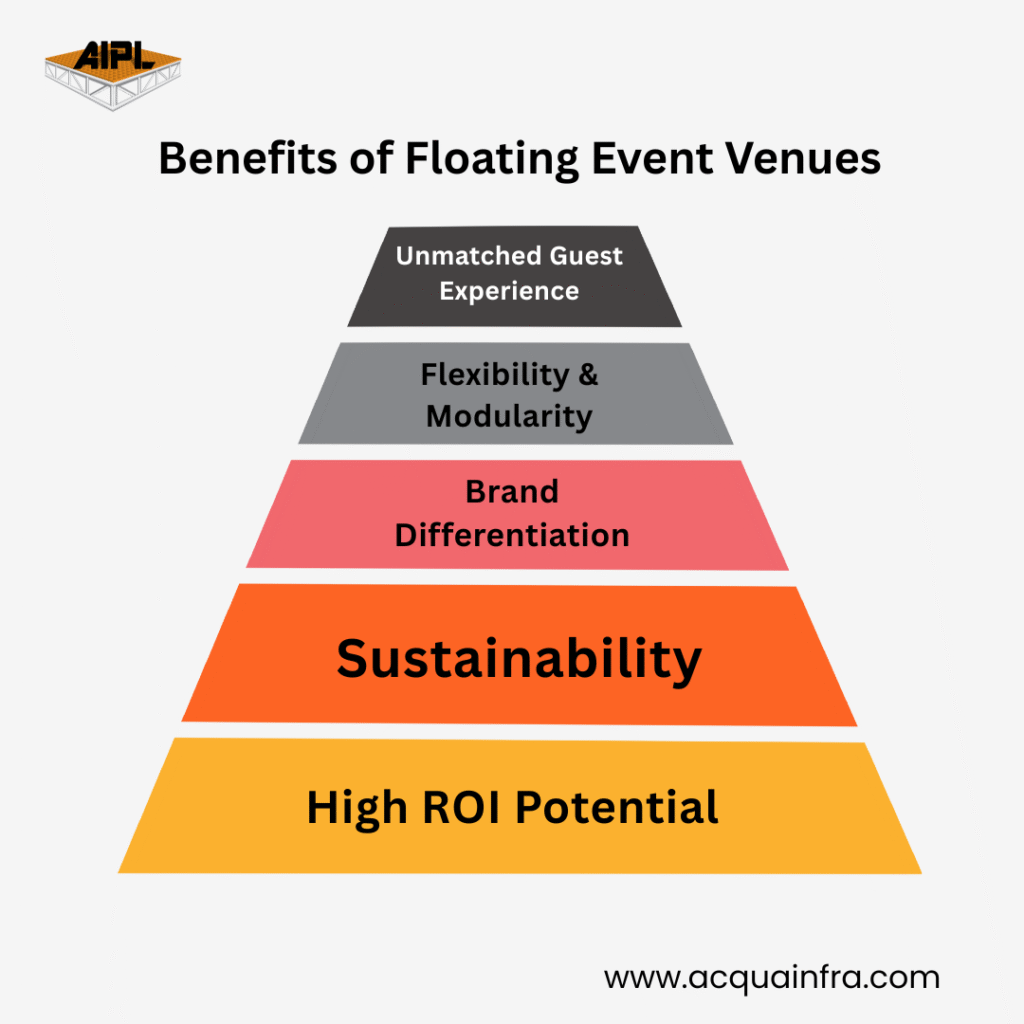
The hospitality industry is built on the principle of constant reinvention. From luxury resorts perched on clifftops to glass igloos under the Northern Lights, the sector has always sought to create experiences that go beyond traditional offerings. Today, as travelers and event organizers crave something that is truly out of the ordinary, floating event venues are making waves across the world.
A floating event venue is exactly what it sounds like — a purpose-built structure on water that offers the facilities of a land-based venue but with the exclusivity, charm, and scenic beauty of being afloat. Whether it’s a wedding on a shimmering lake, a corporate gala with a skyline view, or a cultural concert on a riverfront, these venues are rewriting the rulebook of hospitality.
And the best part? This trend is not just a global phenomenon, India is already catching up with several examples proving how water-based hospitality can add unparalleled value.
Floating venues are far more than novelty ideas — they are multi-purpose assets that can adapt to various hospitality segments. Let’s dive deeper:
Destination weddings are booming in India, and couples are always on the lookout for that one element that makes their big day unforgettable. Floating wedding pavilions provide just that. Imagine exchanging vows on a beautifully decorated pontoon against the backdrop of a sunset-lit lake or river. Guests enjoy the grandeur of a five-star setting while surrounded by natural beauty — creating a truly one-of-a-kind experience.
The Meetings, Incentives, Conferences, and Exhibitions (MICE) sector demands venues that impress. Floating event venues stand out as an innovative alternative to hotels or convention centers. Hosting a board meeting, product launch, or corporate gala on water signals prestige and innovation, instantly setting the tone for high-value discussions. It also helps corporates break away from monotonous setups and energize their teams or clients.
Music festivals and cultural events thrive on atmosphere. Floating amphitheatres or stages built on lakes and rivers create breathtaking settings for performances. Audiences enjoy panoramic views while artists perform against backdrops that no land venue can replicate. Globally, floating concerts have become seasonal tourist attractions — and India, with its rivers and lakes, has immense potential for similar spectacles.
Hotels and resorts can use floating platforms to extend their offerings. Floating restaurants, cocktail bars, yoga pavilions, or spa lounges enhance the guest experience while generating new revenue streams. In tourism-heavy regions like Kerala, Goa, or Kashmir, such floating add-ons can become signature attractions that differentiate one property from another.
These examples underline a powerful truth: India’s waterways hold untapped opportunities for floating hospitality venues.
Floating venues are not just “pretty backdrops” — they deliver real, measurable advantages for businesses in the hospitality sector:

Hospitality is no longer about providing just accommodation or meals — it’s about curating unique experiences. Floating event venues bring together exclusivity, sustainability, and luxury, aligning perfectly with the desires of modern travelers and event organizers.
For India, this trend also represents an opportunity to leverage its rivers, lakes, and waterfronts as commercial assets. Cities like Varanasi, Kochi, Srinagar, and Udaipur could become hubs for floating hospitality, creating tourism appeal while supporting local economies.
Hotels, resorts, and event companies that act now will establish themselves as pioneers in experiential hospitality, gaining a competitive advantage in a growing market.
Floating event venues are not just a passing fad — they are the future of experiential hospitality. By offering breathtaking views, adaptable spaces, and unforgettable experiences, they are redefining how weddings, corporate events, and festivals are celebrated.
Globally, the trend is already strong, and in India, we’re witnessing the early signs of a booming market. Businesses that invest today will shape tomorrow’s hospitality landscape — one that truly floats above the rest.
Looking to create an unforgettable event experience that generates premium revenue? Acquafront Infrastructure designs and builds bespoke, robust floating venues for weddings, corporate events, and restaurants.
Embrace the future of experiential hospitality—start planning your floating venue today.
Design Your Floating Venue: Enquire Now
Q1: What are floating event venues?
Floating event venues are specially designed platforms on water that host events like weddings, conferences, and cultural gatherings.
Q2: Why are floating venues trending in hospitality?
They offer unique, luxury experiences with panoramic settings, ideal for modern travelers seeking exclusivity.
Q3: Are floating event venues safe for large gatherings?
Yes. They use robust anchoring, modular designs, and advanced safety systems to ensure guest comfort and stability.
Q4: Are floating venues available in India?
Yes. Examples include Udaipur’s Lake Palace, Kerala’s Veli Lake restaurant, Srinagar’s floating cafés, and new infrastructure projects in Varanasi.
Q5: Can hotels and resorts integrate floating venues?
Absolutely. They enhance guest experiences and generate additional revenue streams through floating lounges, bars, or banquet spaces.
